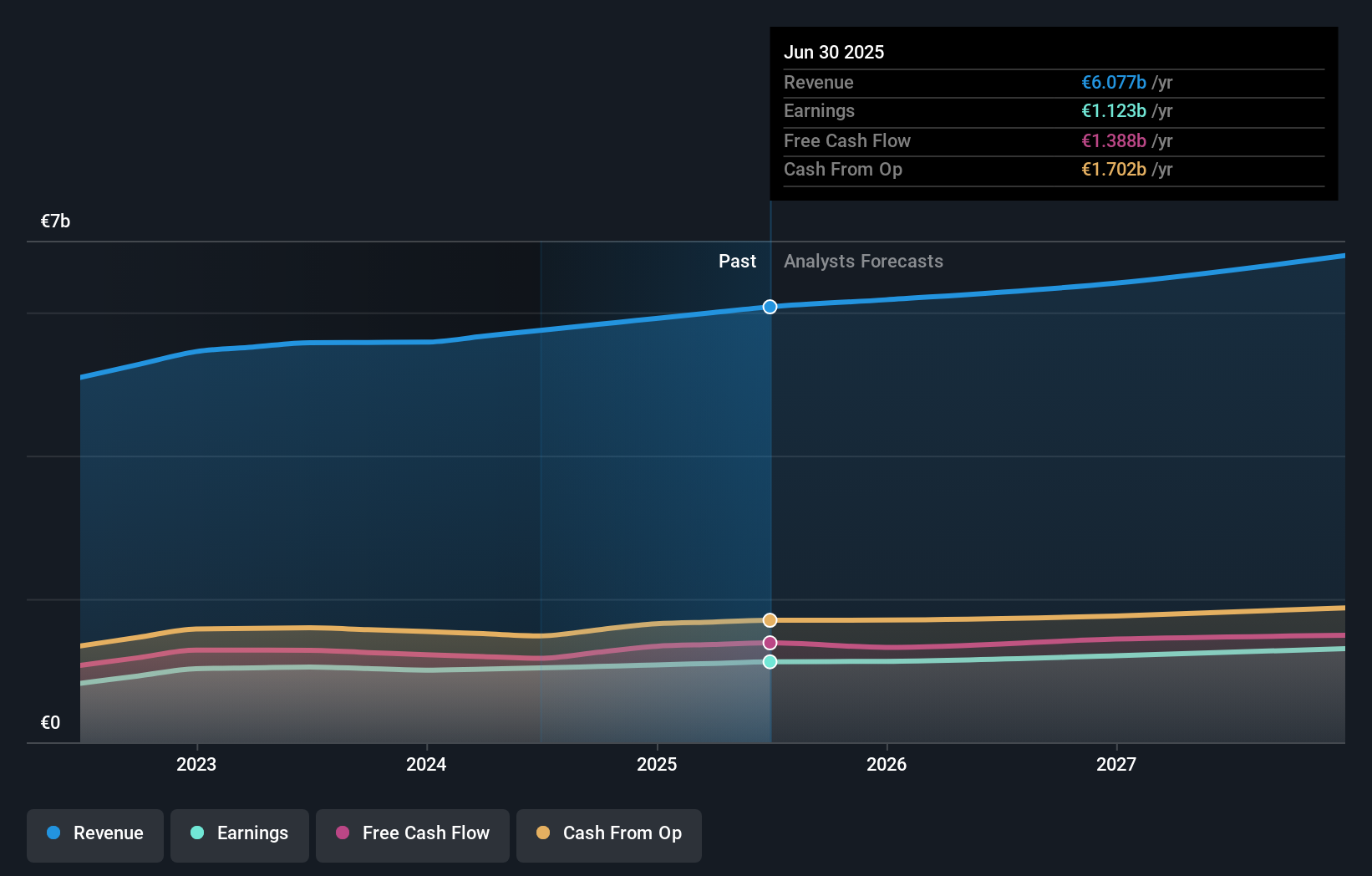- Netherlands
- /
- Professional Services
- /
- ENXTAM:WKL
Wolters Kluwer N.V. (AMS:WKL) most popular amongst individual investors who own 51% of the shares, institutions hold 49%
Key Insights
- Significant control over Wolters Kluwer by individual investors implies that the general public has more power to influence management and governance-related decisions
- The top 25 shareholders own 35% of the company
- Insiders have been buying lately
To get a sense of who is truly in control of Wolters Kluwer N.V. (AMS:WKL), it is important to understand the ownership structure of the business. The group holding the most number of shares in the company, around 51% to be precise, is individual investors. In other words, the group stands to gain the most (or lose the most) from their investment into the company.
Institutions, on the other hand, account for 49% of the company's stockholders. Large companies usually have institutions as shareholders, and we usually see insiders owning shares in smaller companies.
In the chart below, we zoom in on the different ownership groups of Wolters Kluwer.
Check out our latest analysis for Wolters Kluwer

What Does The Institutional Ownership Tell Us About Wolters Kluwer?
Institutional investors commonly compare their own returns to the returns of a commonly followed index. So they generally do consider buying larger companies that are included in the relevant benchmark index.
As you can see, institutional investors have a fair amount of stake in Wolters Kluwer. This implies the analysts working for those institutions have looked at the stock and they like it. But just like anyone else, they could be wrong. If multiple institutions change their view on a stock at the same time, you could see the share price drop fast. It's therefore worth looking at Wolters Kluwer's earnings history below. Of course, the future is what really matters.

We note that hedge funds don't have a meaningful investment in Wolters Kluwer. BlackRock, Inc. is currently the company's largest shareholder with 4.8% of shares outstanding. The Vanguard Group, Inc. is the second largest shareholder owning 4.6% of common stock, and Mawer Investment Management Ltd. holds about 3.1% of the company stock.
Our studies suggest that the top 25 shareholders collectively control less than half of the company's shares, meaning that the company's shares are widely disseminated and there is no dominant shareholder.
While studying institutional ownership for a company can add value to your research, it is also a good practice to research analyst recommendations to get a deeper understand of a stock's expected performance. There are a reasonable number of analysts covering the stock, so it might be useful to find out their aggregate view on the future.
Insider Ownership Of Wolters Kluwer
While the precise definition of an insider can be subjective, almost everyone considers board members to be insiders. The company management answer to the board and the latter should represent the interests of shareholders. Notably, sometimes top-level managers are on the board themselves.
Insider ownership is positive when it signals leadership are thinking like the true owners of the company. However, high insider ownership can also give immense power to a small group within the company. This can be negative in some circumstances.
Our data suggests that insiders own under 1% of Wolters Kluwer N.V. in their own names. It is a very large company, so it would be surprising to see insiders own a large proportion of the company. Though their holding amounts to less than 1%, we can see that board members collectively own €13m worth of shares (at current prices). In this sort of situation, it can be more interesting to see if those insiders have been buying or selling.
General Public Ownership
The general public -- including retail investors -- own 51% of Wolters Kluwer. This size of ownership gives investors from the general public some collective power. They can and probably do influence decisions on executive compensation, dividend policies and proposed business acquisitions.
Next Steps:
It's always worth thinking about the different groups who own shares in a company. But to understand Wolters Kluwer better, we need to consider many other factors. To that end, you should be aware of the 1 warning sign we've spotted with Wolters Kluwer .
Ultimately the future is most important. You can access this free report on analyst forecasts for the company.
NB: Figures in this article are calculated using data from the last twelve months, which refer to the 12-month period ending on the last date of the month the financial statement is dated. This may not be consistent with full year annual report figures.
Valuation is complex, but we're here to simplify it.
Discover if Wolters Kluwer might be undervalued or overvalued with our detailed analysis, featuring fair value estimates, potential risks, dividends, insider trades, and its financial condition.
Access Free AnalysisHave feedback on this article? Concerned about the content? Get in touch with us directly. Alternatively, email editorial-team (at) simplywallst.com.
This article by Simply Wall St is general in nature. We provide commentary based on historical data and analyst forecasts only using an unbiased methodology and our articles are not intended to be financial advice. It does not constitute a recommendation to buy or sell any stock, and does not take account of your objectives, or your financial situation. We aim to bring you long-term focused analysis driven by fundamental data. Note that our analysis may not factor in the latest price-sensitive company announcements or qualitative material. Simply Wall St has no position in any stocks mentioned.
About ENXTAM:WKL
Wolters Kluwer
Provides professional information, software solutions, and services in the Netherlands, rest of Europe, the United States, Canada, the Asia Pacific, Africa, and internationally.
Undervalued with proven track record.
Similar Companies
Market Insights
Community Narratives




